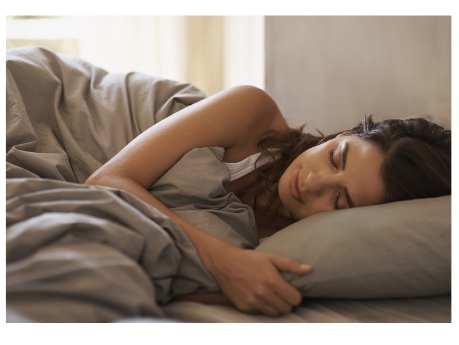Sleep is a really important part of our life. It helps us to feel well, focused and happy. Most people experience a bad night’s sleep now and again, but if you regularly don’t get enough sleep it can really affect how you feel and what you can get done during the day.

How much sleep do I need?
Everyone is different, and the amount of sleep you need might be different to what your friends need. In general though:
Each night, people aged 14-17 need between
8-10 hours
Each night, people aged 18-25 need between
7-9 hours
Why is sleep important for good mental health?
Good sleep habits have been shown to improve mood, concentration and performance at school or work. They may also help control overeating and help prevent obesity. Lack of sleep is linked to symptoms of depression such as feeling down, hopeless, irritable, having thoughts of suicide, and using alcohol or other drugs. Research suggests that for every hour of sleep you miss at night, there is a:
14 ![]()
increase in risk of unpleasant emotions or feelings that affect day to day function
38 ![]()
increase in the chance of feeling sad and hopeless
42 ![]()
increase in the chance of having thoughts of suicide.
58 ![]()
increase in the chance of suicidal behaviour.
23 ![]()
increase in the chance of using tobacco, alcohol or marijuana.
People who regularly go to sleep very late each night and don’t wake up until the afternoon may have Delayed Sleep Phase Syndrome, and are at an increased risk of developing insomnia and depression.
Very short sleepers (less than five hours each night) are more likely to experience long-term mental health issues than people who get enough sleep.
On the other hand, if you sleep more than the recommended amount each night, find it hard to wake up in the morning or still feel tired during the day, something else might be going on.
What gets in the way of a good night’s sleep?
For young people, not getting enough sleep might be caused by:
Biological factors: such as puberty or changes in your body clock
Environmental factors: such as social pressure, school or university workload, use of electronic devices, or using alcohol or other drugs
Tips for a good night’s sleep
If you’re having trouble falling asleep or staying asleep, here are a few things you can try:
- Aim to get to bed and wake up around the same time each day, including on the weekend. This helps your body to get into a routine. Try not to take naps in the day as this affects your body’s routine.
- Turn off your screens (such as your phone, TV and laptop) at least 30 minutes before bed time. The light from screens can stop your brain producing the sleep chemical melatonin, which is important in helping you get to sleep.
- Try not to worry about having a bad sleep. A lot of people underestimate how much sleep they get – so you might find it useful to use a sleep app to see how much sleep you’re getting.
However, if you find that this makes you focus on how much sleep you’re not getting, you may be better off without it.
- Natural sleep cycles are based on your body clock, which is mainly set by when you’re exposed to light. Light is needed in the morning, so aim to be outside for 30 minutes, sit by a bright window, or use a specially designed artificial light sources. In the evening, your body needs less stimulation, so try dimming the lights.
- Exercising during the day is a good way to make you tired at night. This might mean going to the gym, walking around the block at lunchtime or playing sport. Try to avoid exercising last thing at night though, as this can keep you awake.
- It’s best to try and keep your bed for sleep and sex. Working, watching TV or being online in bed can cause your brain to associate bed with being alert and awake.
- Your bedroom should be dark, cool (around 16-18°C) and quiet.
- Try to limit how much caffeine you have, including coffee, energy drinks and soft drinks. Also, try to avoid caffeine entirely after lunchtime.
- Avoid drinking alcohol before bed. It might make you sleepy, but you’re less likely to get good, restful sleep with alcohol in your system.
- Avoid smoking before bed. Discuss ways to quit smoking as well as any other problems with drugs or alcohol with your GP.
- Sleep medications are not usually required to help with sleep problems. While they can help in the short term, they also have a number of side effects and may not give good quality sleep. Your body can also get used to these medications quickly so the effect wears off.
